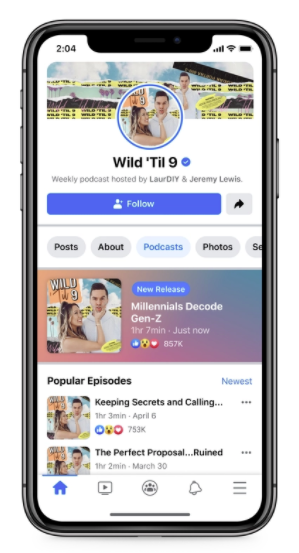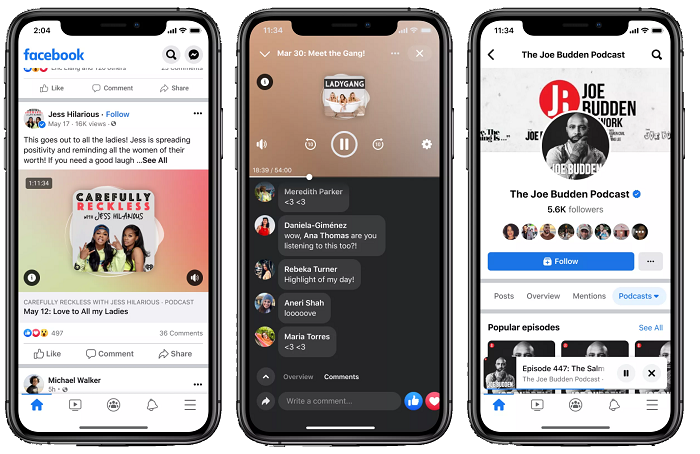It’s things like this that sow distrust among creators and businesses on Facebook.
Today, Bloomberg has reported that Facebook is removing its podcast support and display options, which it launched in June last year, as it shifts focus away from audio options.
As reported by Bloomberg:
“Facebook is pulling out of podcasts and plans to remove them altogether from the social-media service starting June 3. Facebook will stop letting people add podcasts to the service starting this week, according to a note sent to partners. It will discontinue both its short-form audio product Soundbites and remove its central audio hub.”
Facebook first previewed these options last April, as part of a broader push on social audio, in the wake of Clubhouse’s meteoric rise in early 2021.

As you can see, Meta promoted a range of upcoming podcast options, including on-page display tools and direct connection options, which would enable Facebook users to tune in to podcasts without leaving the app.
Meta then officially launched its podcast support tools in June, with various launch partners.

Meta promoted the option as a way to showcase your podcast content to its billions of users, and engage with fans in the app, helping to grow your community.
But now, less than a year later, it’s pulling the plug entirely, leaving any creators who had been using these tools to build their audience out in the cold.
Meta provided a brief statement to Bloomberg, noting that:
“We’re constantly evaluating the features we offer so we can focus on the most meaningful experiences.”
As noted, Meta has a history of pulling the rug out from under creators and brands, whether through reduced Page reach, its ever-changing emphasis on video, pushing creators to use Stories, etc.
And every time, that erodes trust in The Social Network, and serves as a reminder for creators not to build on ‘rented land’. Because Meta can and will change the rules of the game whenever it feels like it. The bottom line is that if you’re relying on its apps to support your community-building efforts, you can expect, at some stage, that it’ll shift focus, and leave you in the lurch as a result.
Of course, Meta has only shown interest in podcasts, really, for a few months, so you would assume that the vast majority of podcasters would have already focused their audience growth efforts elsewhere, as it hasn’t become a key element of the Facebook experience either way.
But even so, it’ll likely bring spark flashbacks for business users that have made various strategic switches at Zuck and Co’s whim, only to be eventually faced with reduced reach and engagement as the company looks to the next shiny object on the horizon, which it can use to suck in more users.
Meta also apparently doesn’t plan on alerting users to the podcast change, opting to leave that up to the publishers instead, while Live Audio Rooms will be integrated into Facebook Live, giving users the option to go live with just audio or audio and video.
So why the change in focus?
I suspect that this, from Meta CEO Mark Zuckerberg in the company’s most recent earnings call, may have something to do with it:
“After the start of COVID, the acceleration of e-commerce led to outsized revenue growth, but we’re now seeing that trend back off. However, based on the strong revenue growth we saw in 2021, we kicked off a number of 2 multi-year projects to accelerate some of our longer term investments, especially in our AI infrastructure, business platform, and Reality Labs. These investments are going to be important for our success and growth over time so I continue to believe we should see them through. But with our current business growth levels, we’re now planning to slow the pace of some of our investments.”
That last line is what I think could be at play here – with costs rising, as it looks towards the metaverse, Meta is now re-assessing its various bets, and streamlining its focus, in order to ensure it manages expenses, and keeps revenue ticking over.
And within that, I suspect that audio is just not as big a deal as some thought it could become early last year.
Some audio elements are still seeing good performance, and Clubhouse itself may well be on a path to establishing a market niche. But clearly, Meta didn’t see a lot of interest or value with this on Facebook, which is why it’s now changing path.
As such, in isolation, this is probably not a big deal, and probably won’t have a huge impact across the board. But again, it is an uncomfortable reminder of how Meta’s focus can shift, and why you shouldn’t get too comfortable with, or reliant on the platform.
There’s massive opportunity for reach and engagement on Facebook, but that always comes with a caveat – that it could all be gone in a flash if the company changes tack.



